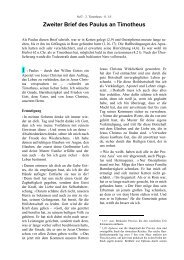You also want an ePaper? Increase the reach of your titles
YUMPU automatically turns print PDFs into web optimized ePapers that Google loves.
6 Transportation of hormones: The blood also<br />
conveys the body’s own chemicals, which are collected<br />
from their points of origin or their places<br />
of storage. Various hormones (Greek horman =<br />
drive, excite) are secreted by the endocrine<br />
glands (Greek éndon = inside, krinein = separate,<br />
excrete). Many vital processes are controlled by<br />
special substances in the blood, known as hormones.<br />
They are produced in certain tissues or<br />
glands, taken up by the blood, and transported to<br />
other specific tissues or <strong>organs</strong>, often located at<br />
considerable distances. There they perform functions<br />
vital to the organism, although they appear<br />
only in minute quantities in the blood.<br />
Some hormones are:<br />
Adrenalin – secreted when the sympathetic nerves<br />
are excited, causing blood vessels to contract.<br />
Renin and angiotensin – control of blood pressure.<br />
Histamine – plays an important role in antigen/<br />
antibody reactions.<br />
Somatotropin – growth hormone<br />
Insulin – controls the processing of the glucose<br />
absorbed in the intestine, as well as that synthesised<br />
by the body itself.<br />
Male and female sexual hormones.<br />
Cortisone – controls (among other things) the<br />
immune response.<br />
Thyroid hormones – control heat and metabolism.<br />
7 Defence: The leucocytes (white blood cells) and<br />
certain chemicals (antibodies) protect the body<br />
against toxins and intruding micro-organisms.<br />
8 Coagulation: Blood coagulation affords a vitally<br />
important protection against loss of blood; it<br />
also repairs damaged blood vessels.<br />
Obviously, the blood carries out vitally important<br />
functions. It is the raison d’être as well as the<br />
handmaiden of the circulatory system. It supplies<br />
each and every cell with fuel (obtained from the<br />
nutrients we ingest), with oxygen, with vitamins,<br />
with hormones, and with warmth. Metabolic<br />
products and excess heat are also carried away<br />
from every cell. Blood flows ceaselessly throughout<br />
our lifetime. It does not collect at specific<br />
points, but flows in a never-ending loop through<br />
the circulatory system. Filling and emptying itself<br />
58<br />
every second with blood, the heart is the centre<br />
of this system.<br />
Composition of the blood: Blood plasma (the<br />
liquid component) comprises 56 % of the blood,<br />
and solid particles (the blood corpuscles) make<br />
up the other 44 %. Three types of corpuscles can<br />
be distinguished:<br />
Red blood corpuscles<br />
– Red blood cells (= erythrocytes; Greek erythrós<br />
= red; kytos = hollowed, convex).<br />
Quantity: 4.5 – 5 million per mm 3 blood<br />
– White blood corpuscles (leucocytes; Greek<br />
leukós = bright, shiny, white).<br />
Quantity: 4,000 – 10,000 per mm 3 blood<br />
Three types can be distinguished: lymphocytes<br />
(30 %), granulocytes (66 %), and monocytes<br />
(4 %)<br />
– Platelets (thrombocytes; Greek thrómbos =<br />
coagulated blood)<br />
Quantity: 150,000 – 350,000 per mm 3 blood<br />
Red blood corpuscles: Did you know that every<br />
drop of blood contains 250 million red cells?<br />
During its average lifespan of 120 days each of<br />
these highly specialised cells performs an<br />
extremely important task: it absorbs oxygen<br />
175,000 times, and discharges carbon dioxide the<br />
same number of times. Its diameter is close to<br />
one thousandth of a millimetre. If all 25 million
















